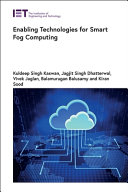

Most ebook files are in PDF format, so you can easily read them using various software such as Foxit Reader or directly on the Google Chrome browser.
Some ebook files are released by publishers in other formats such as .awz, .mobi, .epub, .fb2, etc. You may need to install specific software to read these formats on mobile/PC, such as Calibre.
Please read the tutorial at this link: https://ebookbell.com/faq
We offer FREE conversion to the popular formats you request; however, this may take some time. Therefore, right after payment, please email us, and we will try to provide the service as quickly as possible.
For some exceptional file formats or broken links (if any), please refrain from opening any disputes. Instead, email us first, and we will try to assist within a maximum of 6 hours.
EbookBell Team

0.0
0 reviewsIn this book, all the important topics in fog computing systems are covered, including energy efficiency, quality of service (QoS) issues, reliability and fault tolerance, load balancing, and scheduling. Special attention is devoted to emerging trends and industry needs associated with utilizing mobile edge computing, internet of things (IoT), resource estimation as well as virtualization in the fog computing environment. Current research on automation, robotics, data privacy, security and trust in fog computing is explored in depth. The book also discusses emerging techniques including deep learning, mobile edge computing, smart grid and intelligent transportation systems beyond theoretical and foundational concepts for smart applications including real time traffic surveillance, interoperability of fog computing architecture and smart homes and smart cities.
Intended for an audience of researchers from academia and industry, as well as lecturers, engineers and advanced students, Enabling Technologies for Smart Fog Computing offers valuable insights for those with an interest in the field.